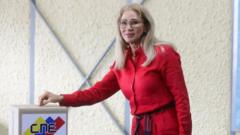Venezuela's ruling party has declared an overwhelming victory in regional and parliamentary elections amid a boycott by major opposition parties. While the CNE reports moderate voter turnout, opposition leaders contest the legitimacy of the elections and highlight repression against dissent. The elections also saw a controversial vote for representatives in the disputed Essequibo region, which has drawn condemnation from Guyana.
Opposition Boycotts Venezuelan Elections as Ruling Party Claims Sweeping Victory

Opposition Boycotts Venezuelan Elections as Ruling Party Claims Sweeping Victory
In a contentious electoral landscape, Venezuela's ruling PSUV party celebrates a significant win, while the opposition, urging a boycott, claims low voter turnout reflects widespread discontent with the Maduro regime.
The ruling United Socialist Party of Venezuela (PSUV) has joyously declared a decisive win in recent regional and parliamentary elections, despite significant opposition boycotting the polls. The electoral council (CNE), heavily aligned with President Nicolás Maduro's administration, claims that the PSUV triumphed in 23 out of 24 gubernatorial contests and obtained 82.68% of votes for the National Assembly, Venezuela’s legislative assembly. However, opposition parties labeled the electoral process a "farce," with leader María Corina Machado asserting that less than 15% of eligible voters participated.
Independent reports from various polling stations indicated a palpable absence of voter turnout, suggesting that the elections lacked public engagement compared to previous electoral events. The CNE purports that 42.6% turned out to vote, a figure met with skepticism by opposition leaders who have long questioned the council's independence, especially given its leadership ties to Maduro's regime.
Notably, this election follows the highly criticized presidential elections held last July, where international observers raised concerns about the transparency and fairness of the results. Opposition candidate Edmundo González, who fled to Spain amidst increased repression, was reported to have won a substantial support base, conflicting with the CNE's declared outcomes.
Machado, who remained in Venezuela amidst threats to her safety, spearheaded the boycott, urging her supporters to refrain from participating in a process they deemed influenced by oppression. Conversely, some opposition figures, such as former presidential candidate Henrique Capriles and Zulia state governor Manuel Rosales, opted to participate, arguing that engaging in the elections was an act of resistance against government control. This decision met backlash from boycott advocates, labeling their actions a betrayal of democratic ideals.
As of now, almost all key states have returned to PSUV governance, showing an increase from prior counts, while the preliminary outcomes indicate they have secured a majority in the National Assembly. Nevertheless, three opposition representatives, including Capriles, managed to gain seats, suggesting remnants of opposition presence amidst an otherwise dominant ruling coalition.
The backdrop of the elections was marked by widespread arrests of over 70 individuals linked to the opposition, accused of attempting to undermine the electoral process through plans of sabotage. Mauro Corina Machado condemned these detentions as blatant acts of state terrorism.
In addition to gubernatorial and legislative elections, Venezuelan voters were also assigned the task of voting for representatives in the Essequibo region, long contested between Venezuela and Guyana. This election occurred despite a ruling from international courts advising against Venezuelan interference, leading to accusations from Guyana's president of Venezuela's actions being opportunistic and without legitimacy.
Amid the ongoing chaos, the Venezuelan electoral aftermath reveals a fractured political landscape, with voices of dissent silenced and the ruling party asserting control under increasingly authoritarian conditions.





















